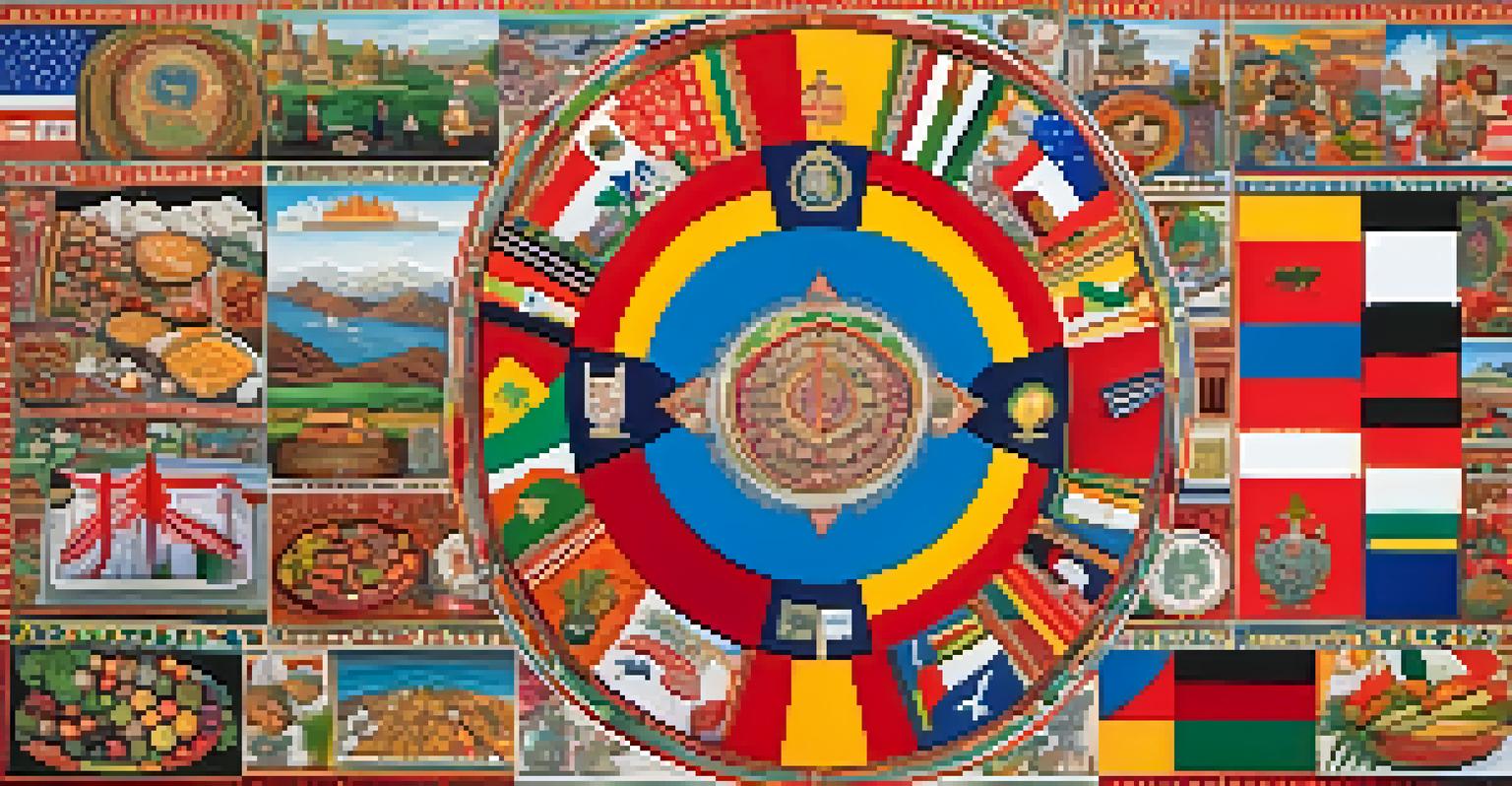How Cultural Exchange Programs Foster Global Understanding

Understanding Cultural Exchange Programs and Their Importance
Cultural exchange programs are initiatives that allow individuals from different countries to experience each other's cultures. They often involve travel, education, and community involvement, enabling participants to immerse themselves in a new environment. These programs are crucial in fostering global understanding and appreciation for diverse backgrounds.
The world is a book, and those who do not travel read only one page.
By engaging with people from different cultures, participants can gain invaluable insights into lifestyles, traditions, and perspectives that differ from their own. This firsthand experience breaks down stereotypes and misconceptions that often fuel division. Ultimately, these exchanges promote a sense of unity and shared humanity, making the world feel a little smaller.
Moreover, cultural exchange programs can take various forms, including student exchanges, internships, and volunteer opportunities. Regardless of the format, the core goal remains the same: to create connections that transcend borders and foster mutual respect among participants.
The Role of Education in Cultural Exchange Programs
Education plays a vital role in cultural exchange programs, as it provides participants with structured learning experiences. Students often attend classes in foreign countries, where they not only learn about the curriculum but also immerse themselves in the local culture. This academic environment encourages dialogue and interaction among peers from diverse backgrounds.

Through educational exchanges, students can develop critical thinking skills and cross-cultural communication abilities. For instance, discussing global issues in a classroom filled with international students can lead to richer conversations and broader perspectives. This exposure helps students become more empathetic and culturally competent individuals.
Cultural Exchange Fosters Understanding
Cultural exchange programs enable individuals to experience diverse cultures, breaking down stereotypes and promoting global unity.
Additionally, educational institutions often support cultural exchange initiatives, recognizing their potential to shape globally-minded citizens. By fostering these programs, schools and universities contribute to a more interconnected world where understanding and cooperation flourish.
Personal Growth Through Cultural Immersion
Participating in a cultural exchange program often leads to profound personal growth. Stepping outside one's comfort zone and adapting to a new culture can be both challenging and rewarding. Participants often find themselves developing new skills, such as language proficiency and problem-solving, as they navigate unfamiliar environments.
We may have different religions, different languages, different colored skin, but we all belong to one human race.
Moreover, the friendships forged during these exchanges can have lasting impacts. Meeting people from different backgrounds fosters a sense of community and belonging that transcends geographical boundaries. These relationships not only enrich participants' lives but also create networks of global citizens committed to understanding and collaboration.
In essence, cultural immersion encourages individuals to reflect on their own identities and biases. By experiencing life through someone else's lens, participants gain a deeper appreciation for diversity and learn to embrace differences rather than fear them.
Contributing to Global Peace and Cooperation
Cultural exchange programs can serve as powerful tools for promoting global peace and cooperation. When individuals from conflicting backgrounds come together, they often find common ground that can help to bridge divides. This dialogue fosters understanding and respect, paving the way for peaceful interactions.
By participating in these programs, individuals become ambassadors of their cultures, sharing their values and stories with others. This cultural diplomacy can defuse tensions and encourage collaboration on global issues, such as climate change and social justice. In this way, cultural exchanges can contribute to a more harmonious world.
Education Enhances Cultural Immersion
Through structured learning experiences abroad, participants develop critical thinking and cross-cultural communication skills.
Furthermore, when people experience the kindness and hospitality of a foreign culture, it can challenge preconceived notions and foster goodwill. These positive interactions create ripple effects, inspiring others to engage in cultural exchange and promoting a cycle of understanding and cooperation.
Enhancing Professional Opportunities Through Cultural Exchange
Cultural exchange programs can significantly enhance professional opportunities for participants. By experiencing different business practices, individuals gain insights that can set them apart in the competitive job market. Employers increasingly value candidates with international experience and cultural competence.
For example, someone who has worked or studied abroad may have a better understanding of global markets and cross-cultural communication. This skill set is particularly important in today's interconnected world, where businesses often operate on a global scale. Participants can leverage their experiences to build diverse networks that may lead to job opportunities.
Moreover, cultural exchanges often include internships or work placements, providing practical experience in a foreign setting. This exposure not only bolsters resumes but also equips participants with the adaptability and resilience needed to thrive in diverse workplaces.
The Impact of Technology on Cultural Exchange Programs
Technology has transformed the landscape of cultural exchange programs, making them more accessible than ever. Online platforms now facilitate virtual exchanges, allowing participants to connect and collaborate without leaving their homes. This adaptability has expanded the reach of cultural programs, especially during global challenges such as the COVID-19 pandemic.
Through virtual exchanges, individuals can engage in discussions, share experiences, and collaborate on projects with peers from around the world. These digital interactions help maintain the essence of cultural exchange while overcoming geographical barriers. This evolution also encourages lifelong learning, as participants can continue to explore new cultures through online resources.
Technology Expands Cultural Connections
Advancements in technology facilitate virtual cultural exchanges, making global engagement more accessible and inclusive.
While virtual exchanges may not replicate the richness of in-person experiences, they offer unique opportunities for connection and understanding. As technology continues to evolve, we can expect cultural exchange programs to adapt, providing even more avenues for global engagement.
Challenges and Solutions in Cultural Exchange Programs
Despite their many benefits, cultural exchange programs face challenges that can impede their effectiveness. Issues such as funding, visa restrictions, and cultural misunderstandings can limit participation and hinder the overall experience. Addressing these challenges is essential for maximizing the impact of cultural exchanges.
For instance, organizations can work to secure funding through partnerships with businesses and governments to support participants financially. Additionally, providing pre-departure training can help participants navigate cultural differences and prepare for their experiences abroad. This support can significantly enhance the effectiveness of these programs.

Moreover, fostering open communication between host and participant communities can alleviate cultural misunderstandings. By promoting dialogue and collaboration, cultural exchange programs can create environments that are welcoming and inclusive, allowing for more meaningful connections.
The Future of Cultural Exchange Programs
As the world continues to evolve, so too will cultural exchange programs. With growing recognition of their importance, we can expect increased investment in these initiatives, both academically and socially. The future of cultural exchange holds promise for fostering even greater global understanding and collaboration.
Innovative approaches, such as hybrid programs that blend virtual and in-person experiences, may emerge to enhance accessibility. These developments will cater to a broader audience, allowing more individuals to participate and benefit from cultural exchanges. The aim will be to create a world where understanding and acceptance are the norms.
Ultimately, as we look to the future, the spirit of cultural exchange will remain vital in navigating the complexities of a globalized world. By fostering connections and understanding across cultures, we can work towards a more peaceful and united future for all.